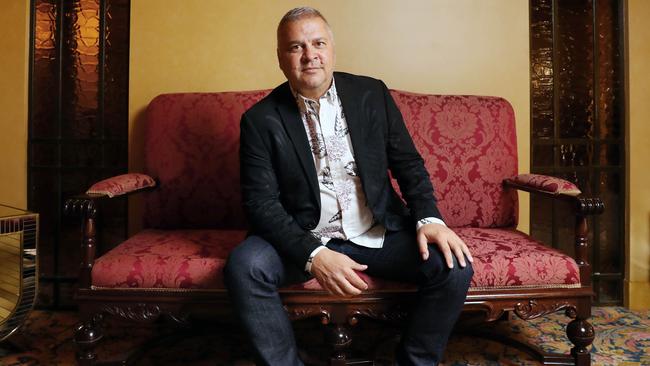Webjet flags more ‘green features’ in Covid recovery plan
The online travel agency will place a greater focus on sustainable travel in the coming year ahead after reporting an $85m loss for the 12 months to March.

Business
Don't miss out on the headlines from Business. Followed categories will be added to My News.
Online booking site Webjet will provide more opportunity for travellers to craft sustainable trips in future, after noting a significant shift in consumer sentiment as demand for travel returns.
Webjet CEO John Guscic flagged the changes after announcing an $85m statutory loss for the business in the 12 months to March 2022.
The result was a significant improvement on the $156.6m loss in the nine months prior, aided by a healthy surge in revenue from $38.5m to $138m.
Mr Guscic said the two main parts of the business, WebBeds and Webjet OTA were now both profitable with an average cash surplus of $4m a month.
Opening his presentation with the declaration “travel’s back baby”, Mr Guscic said the quest for exploration and the longing to see friends and family had never been higher.
He said the North American market was especially strong with booking volumes already double what they were pre-pandemic, and Europe was quickly catching up.
Only the Asia Pacific remained unprofitable due to ongoing restrictions on travel particularly in China and Japan.
International bookings continued to be subdued as a result of the reduced airline capacity available, however domestic bookings were booming, Mr Guscic said.
For the year to March 31, Webjet OTA took 662,000 bookings, compared to 370,000 in the previous 12 months, and 1.575 million in the 2019 calendar year.
WebBeds was closer to pre-Covid levels with 2.5 million bookings in the year to March 31, compared to 4.2 million in 2019.
Mr Guscic said the company had benefited from the disappearance of a number of competitors during the pandemic and the ongoing popularity of online booking sites despite predictions to the contrary.
“The evidence is that online travel agents have exceeded the performance of bricks and mortar travel agents over the course of the recovery, there’s no evidence to the contrary anywhere in the world,” he said.
“Everyone is comfortable with the choice and convenience websites offer, whether it’s fashion or white goods or anything else. The natural follow on is people are happy and comfortable self-selecting in the travel environment.”
In the next year, sustainable travel was expected to become a greater feature of the Webjet business, which recently began offering the option for customers to carbon offset their trips.
“Consumers are looking for more information about sustainability (and) it’s something you will hear more about from us over the next 12 months,” Mr Guscic said.
“We’ve just introduced carbon offsets on our website and we’re seeing a remarkably rapid uptake of consumers offsetting their carbon footprint.”
Singapore Airlines also delivered its full year results on Thursday, posting a $627m loss for the 12 months to March 31, down from $2.6bn in the previous corresponding period.
The reopening of Singapore and surging demand for air travel even saw the carrier climb back into the black in the second half, recording a $10.3 million profit.
Regional vice-president South-West Pacific, Louis Arul, said the airline was now operating more than 100 flights a week into Australia, representing 75 per cent of pre-Covid capacity.
“The recovery has taken a lot of airlines by surprise. The strong and robust travel even into and out of Australia was really unexpected but that is quite positive for us,” Mr Arul said.
“We didn’t remove a lot of aircraft and we didn’t let go of a lot of staff (during Covid) and because of that we’re very quickly able to mount new services as demand returns.”
As with other airlines, Singapore was seeing overwhelming demand for premium cabins post-Covid with business cabins packed on almost every flight.
Mr Arul said it could be a hangover from Covid where passengers feel “a bit more comfortable in the larger seat with more space”.
“I’m sure if it’s sustained moving forward, airlines will certainly adjust (seating configurations) accordingly,” he said.
In an effort to accommodate more travellers in the airline’s lounge at Changi Airport, 50 per cent more capacity had been added in a $50m pandemic refurbishment.
Set to reopen in mid-June, the lounge makeover signalled Singapore Airline’s readiness for growth as Covid restrictions eased in more countries.
In the year to March 31, 3.9 million passengers flew with Singapore, up six-fold from a year before, delivering $2.9bn in revenue.
Originally published as Webjet flags more ‘green features’ in Covid recovery plan



